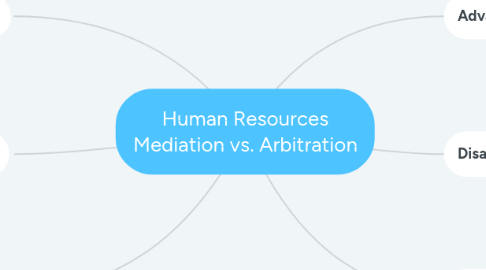
1. Advantages of Mediation
1.1. Mediation is much less expensive than arbitration and litigation. The employer and employee save significant amounts of money using a mediator opposed to litigation. Court fees can add up astronomically.
1.1.1. Mediation is conducted by a neutral third party that does not make decisions regarding the outcome, they only make recommendations for dispute resolution. Neither party is forced into a decision, they have the freedom to continue negotiating until an agreement is met.
1.1.1.1. Mediation is confidential. Neither party has to worry about the dispute being publicized. Many disputes are very sensitive and could be extremely embarrassing to either party.
2. Disadvantages of Mediation
2.1. Both parties may not get what they hope for out of mediation. If one party is unreasonable, it may be very difficult to reach an agreement.
2.1.1. There are no real rules or set processes to mediation. If the mediator is not skilled at keeping the process flowing, the issue could reach an impasse and litigation is required.
2.1.1.1. Either party can withdraw from mediation at any given time. This will result in an unresolved dispute and require arbitration or litigation.
3. Advantages of Arbitration
3.1. Arbitration can cost much less that litigation and court fees. Both the employer and employee may have to pay a large amount of money for arbitration.
3.1.1. Arbitration provides both parties to resolve issues among themselves rather than taking their chances with a judge or jury.
3.1.1.1. Arbitration can be faster than litigation. it can also help minimize the amount of hostility between the parties. If they are working together towards a resolution, they are less likely to be hostile towards one another.
4. Disadvantages of Arbitration
4.1. Arbitration can be binding. If either party is not satisfied with the decision, they could be stuck with it forever and never have the ability to take the issue to court.
4.1.1. There is concern that arbitrators tend to side with large corporations. This can create an uneven playing ground
4.1.1.1. Because arbitration is confidential, some people think of this as being biased because the cases are rarely every reviewed by the courts.
5. Arbitrator Qualifications
5.1. Arbitrators should have experience working with the law. Their experience varies with the types of disputes they are assigned to.
5.1.1. Arbitrators that are assigned to corporate disputes should have some career experience with corporations policies and procedures. They will need to patient and not adverse to conflict.
5.1.1.1. Arbitrators that are assigned to labor disputes will requires experience with unions and collective bargaining agreements.
5.1.1.1.1. Arbitrators must be objective and have the skills to listen to both parties and identify exactly what each party is trying to get out of the resolution. They need to make unbiased decisions.
6. Mediator Qualifications
6.1. Most mediators are also lawyers. However, mediators are not to provide legal counsel during a mediation. They can only assist the parties with reaching an agreement by providing suggestions and facilitating the conversations.
6.1.1. Very skilled mediators have years of experience in the field that they are representing. The knowledge base helps them understand the inner workings of the business and how to best resolve disputes.
6.1.1.1. Mediators should also have strong interpersonal skills and in depth knowledge and experience with union negotiations. It is important that they understand human resource policies and procedures and collective bargaining agreements.
6.1.1.1.1. Mediators should be able to objectively review the situation and listen to both parties in order to make an unbiased recommendation.
